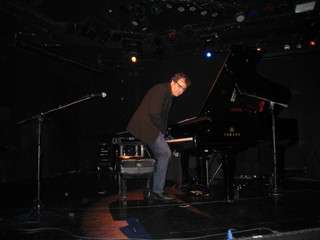|
Back
The Jewel in the Fish New York
Le Poisson Rouge, 162 Bleecker Street
08/09/2010 -
Philip Glass: Etude No. 4 – Etude No. 5
Nico Muhly: Drones & Piano (New York premiere)
John Cage: Dream
Alvin Curran: Inner Cities 2
Bruce Brubaker (Piano)

B. Brubaker at Le Poisson Rouge (© Herring Rollmop)
The reputation of Bruce Brubaker is more than legendary. Like David Tudor two generations ago, Mr. Brubaker is an icon for music of our time, having premiered works by Philip Glass, John Cage and (last night) Nico Muhly, amongst many others.
This was my first live recital with Mr. Brubaker, and the single hour spent in Le Poisson Rouge was like the visit to a Fifth Avenue jewelry store. Not that I’ve ever been to such an establishment, but I would imagine that the sonority, the whispering pianissimi, and the unerring way he metathesized convolution into meditation was radiating
Not that the mini-recital was faultless. Le Poisson Rouge does have the problem of being a bar-café, and during the most tranquil moments, waitpeople would have to t..i..p..t..o..e so softly, and set the drinks oh so quietly on the table. Add to that a large screen in the background which erratically gave off the wrong video images at the wrong time.
None of those distractions distracted Mr. Brubaker, who, from the first notes, set an almost mystical mood. The initial work was an unlikely John Cage, his Dream. Those who know Mr. Cage from his aleatory Music for Radios or 4’33” don’t realize that even in his latest years he could produce some lyrical even lulling music. Dream was a peripatetic keyboard romance, with a languorous pedal-down resonance verging on a schmaltz, though nmever going over the edge. (Could I compare moments of Cage to moments of Rachmaninoff without readers throwing up? Okay!)
The first Philip Glass Etude continued this informal tranquility, though the second Etude was more Glass style of subtle percussive repetition.
Mr. Brubaker’s third piece was a group of five short pieces by Nico Muhly, whose Stride was recently played by the Voxare Quartet. That work was pleasantly unchallenging. His Drones and Piano was peripherally more ambitious, since each of the five pieces, inspired by (sometimes quoting) Haydn was accompanied by a different electronic drone in the background. Like all the music last night, Mr. Muhly presented deceivingly simple piano works–one with chorale, others with pleasant even seductive themes–stilling, if never tranquilizing the listener.
The last piece, which seemed the longest (I’ve never had a timepiece, so must depend on psychic durations) was by that wonderful writer, Alvin Curran. (I use “writer” in the literal sense, since he describes his musical adventures in Europe like an asexual Ned Rorem on steroids.)
He has written countless “Inner City” pieces, but this, his second, was so cryptic that it took me an hour to figure out–possibly–what it was all about.
Most of the music consisted of three notes in a row, followed by an out-of-place note either a ninth or tenth about them. With the slightest variants, they were repeated over and over again. The note variants were welcome. But the time variations were fascinating. And here Mr. Brubaker was unassailable. The rests were for a quaver or a hemidemisemiquaver, or none at all. The tension was palpable to a degree, until it began to get boring.
And then Mr. Curran sprang the surprise. A bit of harmony thickening, I began to hum to myself, “My heart is sad and lonely, For you I cry….”
Yes, it was Johnny Green’s great jazz-pop tune, Body and Soul. Just a few bars, cocktail piano style before the original notes. But what were those few bars doing in this minimalist music?
On the way back, I was musing on Mr. Brubaker’s genius, when the first notes of Curran’s music came back–and I realized that those mutant intervals were almost the same as Body and Soul itself. I don’t know Mr. Curran’s purpose, but the segue, as played by Bruce Brubaker, was like a unification of all musics
In other words, honest joy.
Harry Rolnick
|